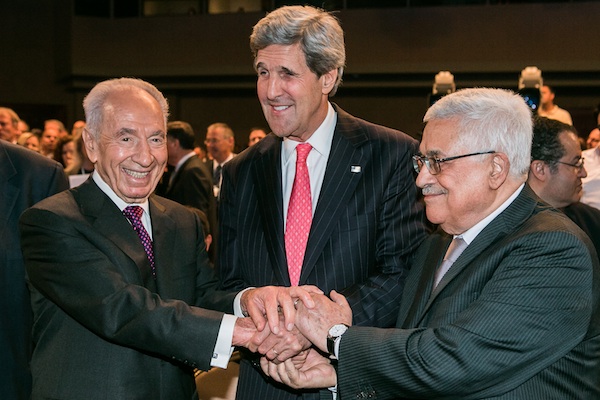Obama clarified last week that the United States has its own distinct interests, and renewing Israeli-Palestinian peace talks is certainly one of them. But is the U.S. actually aiming for peace, or does the peace process itself serve American interests in the region?
The United States is once again thrusting itself into one of the more intractable conflicts of the past century. U.S. Secretary of State John Kerry has touched down in Israel every few weeks since taking office and Barack Obama finally made his first visit as president, throwing his weight behind Kerry’s efforts. Although it may seem like a given, there is one important question: why?
In his second term, President Obama appears to be taking seriously his goal to reverse the foreign policy disaster his predecessor created in the Middle East. By pulling U.S. troops out of Afghanistan he will have ended both of George W. Bush’s conventional wars, and just last week, he announced an eventual end to Bush’s more ambiguous war on terror. Going even further, Obama announced limitations and offered explanations for his own – extremely unpopular and deadly – drone program, which has exponentially increased ill will toward the U.S. in Muslim countries.
But hidden in his speech on drone and counter-terrorism strategy, Obama gave context to the U.S.’s interests in its latest attempt to jump-start the Israeli-Palestinian peace process.
“We are working to promote peace between Israelis and Palestinians – because it is right, and because such a peace could help reshape attitudes in the region,” the President explained. (Emphasis added)
It’s a concept Obama introduced in a much-anticipated and quickly forgotten speech outlining his administration’s foreign policy in the Middle East two years ago. Speaking to diplomats at Foggy Bottom, he said, the Israeli-Palestinian “conflict has come with a larger cost to the Middle East, as it impedes partnerships that could bring greater security and prosperity and empowerment to ordinary people.”
In other words, the perpetuation of Israel’s life-long conflict with the Palestinians and wider Arab world harms U.S. interests in the region. Taking the conflict off the table would shrink many of America’s hurdles to advancing its diplomatic, military, economic and energy interests in the Arab and Muslim worlds.
Without explicitly mentioning American interests, the U.S. secretary of state this week warned that failure to resolve – or at least address – the Palestinian-Israeli conflict would result in “perpetual war.” That war is not Israel’s alone, it is also Washington’s, irrespective of whether there are American boots on the ground.
It is in that context that the United States is making its latest push to restart negotiations between Israelis and Palestinians. As Obama affirmed last week, the United States does have a moral interest in ending the occupation and making peace. But the greater interest is freeing the United States from the bonds of negative association with Palestine’s occupier.
So what does an American president do? He makes a public effort. If something comes of it, great. If it never goes further than resurrecting the long-exhausted and self-interested process with little hope making actual peace, well at least he can say he tried.
A few days ago, Noam Sheizaf argued that the best thing Kerry can do for peace is to admit that there’s no peace process: “Kerry would have done his own cause justice if he simply stated that there is no peace process, nor has there been one in recent times.” The argument holds water. Israelis need to be shown – and made to feel –that the situation is not tenable, and forcing them to deal with the occupation’s consequences may accomplish that goal.
Sheizaf’s mistake, however, lies in his assessment of Kerry’s “cause.” Peace is not America’s primary interest, although it would certainly serve Washington – and especially the State Department. America’s interest is what a peace process, and perceived American determination to end injustice in Palestine, can do for American foreign policy, standing and influence in the region.
Although not the topic of his recent speech, Obama put significant emphasis on the need to enlarge and strengthen Washington’s soft power in the world. “American leadership has always been elevated by our ability to connect with peoples’ hopes, and not simply their fears,” he said, in defense of domestically unpopular foreign aid programs.
Connecting with peoples’ hopes and dreams may sound like a continuation of Obama’s 2008 election campaign and a humanistic approach to world leadership by making and strengthening friendships. Primarily, however, it is a vehicle for furthering foreign policy goals and rebuilding American hegemony.
As Henry Kissinger once paraphrased Charles de Gualle, “America has no permanent friends or enemies, only interests.”
Obama is not venturing back into Middle East peacemaking with the pure intention of making the world a better place, or of making peace. He needs a peace process for his administration’s and his country’s own interests in the region. If Kerry is successful in achieving what both Israelis and Palestinians have largely given up on, Obama will be happy. But even if the next peace process bears no fruit, he will also be able to claim a quiet victory. It is entirely possible that at least as much as peace, the process is the goal: a convoluted good-will gesture toward the Arab world.
Of course, a fruitless process could spell disaster for Israelis and Palestinians. Even when it provides only miniscule hope for those on the ground, a peace process inherently raises expectations, and high expectations can lead to greater disappointment and despair, which in turn can bring violent deterioration on the ground.


